- Home
- Nathaniel Hawthorne
The Gentle Boy Page 2
The Gentle Boy Read online
Page 2
Their antipathy to the poor infant was also increased by the ill success of divers theological discussions, in which it was attempted to convince him of the errors of his sect. Ilbrahim, it is true, was not a skilful controversialist; but the feeling of his religion was strong as instinct in him, and he could neither be enticed nor driven from the faith which his father had died for. The odium of this stubbornness was shared in a great measure by the child’s protectors, insomuch that Tobias and Dorothy very shortly began to experience a most bitter species of persecution, in the cold regards of many a friend whom they had valued. The common people manifested their opinions more openly. Pearson was a man of some consideration, being a Representative to the General Court, and an approved Lieutenant in the train-bands, yet within a week after his adoption of Ilbrahim, he had been both hissed and hooted. Once, also, when walking through a solitary piece of woods, he heard a loud voice from some invisible speaker; and it cried, ‘What shall be done to the backslider? Lo! the scourge is knotted for him, even the whip of nine cords, and every cord three knots!’ These insults irritated Pearson’s temper for the moment; they entered also into his heart, and became imperceptible but powerful workers towards an end, which his most secret thought had not yet whispered.
* * * * * * *
On the second Sabbath after Ilbrahim became a member of their family, Pearson and his wife deemed it proper that he should appear with them at public worship. They had anticipated some opposition to this measure from the boy, but he prepared himself in silence, and at the appointed hour was clad in the new mourning suit which Dorothy had wrought for him. As the parish was then, and during many subsequent years, unprovided with a bell, the signal for the commencement of religious exercises was the beat of a drum. At the first sound of that martial call to the place of holy and quiet thoughts, Tobias and Dorothy set forth, each holding a hand of little Ilbrahim, like two parents linked together by the infant of their love. On their path through the leafless woods, they were overtaken by many persons of their acquaintance, all of whom avoided them, and passed by on the other side; but a severer trial awaited their constancy when they had descended the hill and drew near the pine-built and undecorated house of prayer. Around the door, from which the drummer still sent forth his thundering summons, was drawn up a formidable phalanx, including several of the oldest members of the congregation, many of the middle-aged, and nearly all the younger males. Pearson found it difficult to sustain their united and disapproving gaze, but Dorothy, whose mind was differently circumstanced, merely drew the boy closer to her, and faltered not in her approach. As they entered the door, they overheard the muttered sentiments of the assemblage, and when the reviling voices of the little children smote Ilbrahim’s ear, he wept.
The interior aspect of the meeting-house was rude. The low ceiling, the unplastered walls, the naked wood-work, and the undraperied pulpit, offered nothing to excite the devotion, which, without such external aids, often remains latent in the heart. The floor of the building was occupied by rows of long, cushionless benches, supplying the place of pews, and the broad-aisle formed a sexual division, impassable except by children beneath a certain age.
Pearson and Dorothy separated at the door of the meeting-house, and Ilbrahim, being within the years of infancy, was retained under the care of the latter. The wrinkled beldams involved themselves in their rusty cloaks as he passed by; even the mild-featured maidens seemed to dread contamination; and many a stern old man arose, and turned his repulsive and unheavenly countenance upon the gentle boy, as if the sanctuary were polluted by his presence. He was a sweet infant of the skies, that had strayed away from his home, and all the inhabitants of this miserable world closed up their impure hearts against him, drew back their earth-soiled garments from his touch, and said, ‘We are holier than thou.’
Ilbrahim, seated by the side of his adopted mother, and retaining fast hold of herhand, assumed a grave and decorous demeanor, such as might befit a person of matured taste and understanding, who should find himself in a temple dedicated to some worship which he did not recognise, but felt himself bound to respect. The exercises had not yet commenced, however, when the boy’s attention was arrested by an event, apparently of trifling interest. A woman, having her face muffled in a hood, and a cloak drawn completely about her form, advanced slowly up the broad-aisle and took place upon the foremost bench. Ilbrahim’s faint color varied, his nerves fluttered, he was unable to turn his eyes from the muffled female.
When the preliminary prayer and hymn were over, the minister arose, and having turned the hour-glass which stood by the great bible, commenced his discourse. He was now well stricken in years, a man of pale, thin countenance, and his grey hairs were closely covered by a black velvet scull-cap. In his younger days he had practically learned the meaning of persecution, from Archbishop Laud, and he was not now disposed to forget the lesson against which he had murmured then. Introducing the often discussed subject of the Quakers, he gave a history of that sect, and a description of their tenets, in which error predominated, and prejudice distorted the aspect of what was true He adverted to the recent measures in the province, and cautioned his hearers of weaker parts against calling in question the just severity, which God-fearing magistrates had at length been compelled to exercise. He spoke of the danger of pity, in some cases a commendable and christian virtue, but inapplicable to this pernicious sect. He observed that such was their devilish obstinacy in error, that even the little children, the sucking babes, were hardened and desperate hereties. He affirmed that no man, without Heaven’s especial warrant, should attempt their conversion, lest while he lent his hand to draw them from the slough, he should himself be precipitated into its lowest depths.
The sands of the second hour were principally in the lower half of the glass, when the sermon concluded. An approving murmur followed, and the clergyman having given out a hymn, took his seat with much self-congratulation, and ondeavored to read the effect of his eloquence in the visages of the people. But while voices from all parts of the house were tuning themselves to sing, a scene occurred, which, though not very unusual at that period in the province, happened to be without precedent in this parish.
The muffled female, who had hitherto sat motionless in the front rank of the audience, now arose, and with slow, stately, and unwavering step, ascended the pulpit stairs. The quaverings of incipient harmony were hushed, and the divine sat in speechless and almost terrified astonishment, while she undid the door, and stood up in the sacred desk from which his maledictions had just been thundered. She then divested herself of the cloak and hood, and appeared in a most singular array. A shapeless robe of sackcloth was girded about her waist with a knotted cord; her raven hair fell down upon her shoulders, and its blackness was defiled by pale streaks of ashes, which she had strewn upon her head. Her eyebrows, dark and strongly defined, added to the deathly whiteness of a countenance which, emaciated with want, and wild with enthusiasm and strange sorrows, retained no trace of earlier beauty. This figure stood gazing earnestly on the audience, and there was no sound, nor any movement, except a faint shuddering which every man observed in his neighbor, but was scarcely conscious of in himself. At length, when her fit of inspiration came, she spoke, for the first few moments, in a low voice, and not invariably distinct utterance. Her discourse gave evidence of an imagination hopelessly entangled with her reason; it was a vague and incomprehensible rhapsody, which, however, seemed to spread its own atmosphere round the hearer’s soul, and to move his feelings by some influence unconnected with the words. As she proceeded, beautiful but shadowy images would sometimes be seen, like bright things moving in a turbid river; or a strong and singularly shaped idea leapt forth, and seized at once on the understanding or the heart. But the course of her unearthly eloquence soon led her to the persecutions of her sect, and from thence the step was short to her own peculiar sorrows. She was naturally a woman of mighty passions, and hatred and revenge now wrapped themselves in the garb of piety; t
he character of her speech was changed, her images became distinct though wild, and her denunciations had an almost hellish bitterness.
‘The Governor and his mighty men,’ she said, ‘have gathered together, taking counsel among themselves and saying, “What shall we do unto this people--even unto the people that have come into this land to put our iniquity to blush?” And lo! the devil entereth into the council-chamber, like a lame man of low stature and gravely apparelled, with a dark and twisted countenance, and a bright, downcast eye. And he standeth up among the rulers; yea, he goeth to and fro, whispering to each; and every man lends his ear, for his word is “slay, slay!” But I say unto ye, Woe to them that slay! Woe to them that shed the blood of saints! Woe to them that have slain the husband, and cast forth the child, the tender infant, to wander homeless, and hungry, and cold, till he die; and have saved the mother alive, in the cruelty of their tender mercies! Woe to them in their life-time, cursed are they in the delight and pleasure of their hearts! Woe to them in their death-hour, whether it come swiftly with blood and violence, or after long and lingering pain! Woe, in the dark house, in the rottenness of the grave, when the children’s children shall revile the ashes of the fathers! Woe, woe, woe, at the judgment, when all the persecuted and all the slain in this bloody land, and the father, the mother, and the child, shall await them in a day that they cannot escape! Seed of the faith, seed of the faith, ye whose hearts are moving with a power that ye know not, arise, wash your hands of this innocent blood! Lift your voices, chosen ones, cry aloud, and call down a woe and a judgment with me!’
Having thus given vent to the flood of malignity which she mistook for inspiration, the speaker was silent. Her voice was succeeded by the hysteric shrieks of several women, but the feelings of the audience generally had not been drawn onward in the current with her own. They remained stupified, stranded as it were, in the midst of a torrent, which deafened them by its roaring, but might not move them by its violence. The clergyman, who could not hitherto have ejected the usurper of his pulpit otherwise than by bodily force, now addressed her in the tone of just indignation and legitimate authority.
‘Get you down, woman, from the holy place which you profane,’ he said. ‘Is it to the Lord’s house that you come to pour forth the foulness of your heart, and the inspiration of the devil? Get you down, and remember that the sentence of death is on you; yea, and shall be executed, were it but for this day’s work?’
‘I go, friend, I go, for the voice hath had its utterance,’ replied she, in a depressed and even mild tone. ‘I have done my mission unto thee and to thy people. Reward me with stripes, imprisonment, or death, as ye shall be permitted.’
The weakness of exhausted passion caused her steps to totter as she descended the pulpit stairs. The people, in the meanwhile, were stirring to and fro on the floor of the house, whispering among themselves, and glancing towards the intruder. Many of them now recognised her as the woman who had assaulted the Governor with frightful language, as he passed by the window of her prison; they knew, also, that she was adjudged to suffer death, and had been preserved only by an involuntary banishment into the wilderness. The new outrage, by which she had provoked her fate, seemed to render further lenity impossible; and a gentleman in military dress, with a stout man of inferior rank, drew towards the door of the meeting-house, and awaited her approach. Scarcely did her feet press the floor, however, when an unexpected scene occurred. In that moment of her peril, when every eye frowned with death, a little timid boy pressed forth, and threw his arms round his mother.
‘I am here, mother, it is I, and I will go with thee to prison,’ he exclaimed.
She gazed at him with a doubtful and almost frightened expression, for she knew that the boy had been cast out to perish, and she had not hoped to see his face again. She feared, perhaps, that it was but one of the happy visions, with which her excited fancy had often deceived her, in the solitude of the desert, or in prison. But when she felt his hand warm within her own, and heard his little eloquence of childish love, she began to know that she was yet a mother.
‘Blessed art thou, my son,’ she sobbed. ‘My heart was withered; yea, dead with thee and with thy father; and now it leaps as in the first moment when I pressed thee to my bosom.’
She knelt down, and embraced him again and again, while the joy that could find no words, expressed itself in broken accents, like the bubbles gushing up to vanish at the surface of a deep fountain. The sorrows of past years, and the darker peril that was nigh, cast not a shadow on the brightness of that fleeting moment. Soon, however, the spectators saw a change upon her face, as the consciousness of her sad estate returned, and grief supplied the fount of tears which joy had opened. By the words she uttered, it would seem that the indulgence of natural love had given her mind a momentary sense of its errors, and made her know how far she had strayed from duty, in following the dictates of a wild fanaticism.
‘In a doleful hour art thou returned to me, poor boy,’ she said, ‘for thy mother’s path has gone darkening onward, till now the end is death. Son, son, I have borne thee in my arms when my limbs were tottering, and I have fed thee with the food that I was fainting for; yet I have ill performed a mother’s part by thee in life, and now I leave thee no inheritance but woe and shame. Thou wilt go seeking through the world, and find all hearts closed against thee, and their sweet affections turned to bitterness for my sake. My child, my child, how many a pang awaits thy gentle spirit, and I the cause of all!’
She bid her face on Ilbrahim’s head, and her long, raven hair, discolored with the ashes of her mourning, fell down about him like a veil. A low and interrupted moan was the voice of her heart’s anguish, and it did not fail to move the sympathies of many who mistook their involuntary virtue for a sin. Sobs were audible in the female section of the house, and every man who was a father, drew his hand across his eyes. Tobias Pearson was agitated and uneasy, but a certain feeling like the consciousness of guilt oppressed him, so that he could not go forth and offer himself as the protector of the child. Dorothy, however, had watched her husband’s eye. Her mind was free from the influence that had begun to work on his, and she drew near the Quaker woman, and addressed her in the hearing of all the congregation.
‘Stranger, trust this boy to me, and I will be his mother,’ she said, taking Ilbrahim’s hand, ‘Providence has signally marked out my husband to protect him, and he has fed at our table and lodged under our roof, now many days, till our hearts have grown very strongly unto him. Leave the tender child with us, and be at ease concerning his welfare.’
The Quaker rose from the ground, but drew the boy closer to her, while she gazed earnestly in Dorothy’s face. Her mild, but saddened features, and neat, matronly attire, harmonized together, and were like a verse of fireside poetry. Her very aspect proved that she was blameless, so far as mortal could be so, in respect to God and man; while the enthusiast, in her robe of sackcloth and girdle of knotted cord, had as evidently violated the duties of the present life and the future, by fixing her attention wholly on the latter. The two females, as they held each a hand of Ilbrahim, formed a practical allegory; it was rational piety and unbridled fanaticism, contending for the empire of a young heart.
‘Thou art not of our people,’ said the Quaker, mournfully.
‘No, we are not of your people,’ replied Dorothy, with mildness, ‘but we are Christians, looking upward to the same Heaven with you. Doubt not that your boy shall meet you there, if there be a blessing on our tender and prayerful guidance of him. Thither, I trust, my own children have gone before me, for I also have been a mother; I am no longer so,’ she added in a faltering tone, ‘and your son will have all my care.’
‘But will ye lead him in the path which his parents have trodden?’ demanded the Quaker. ‘Can ye teach him the enlightened faith which his father hath died for, and for which, I, even I, am soon to become an unworthy martyr? The boy has been baptized in blood: will ye keep the mark fresh and ruddy upon his fore
head?’
‘I will not deceive you,’ answered Dorothy. ‘If your child become our child, we must breed him up in the instruction which Heaven has imparted to us; we must pray for him the prayers of our own faith; we must do towards him according to the dictates of our own consciences, and not of your’s. Were we to act otherwise, we should abuse your trust, even in complying with your wishes.’
The mother looked down upon her boy with a troubled countenance, and then turned her eyes upward to Heaven. She seemed to pray internally, and the contention of her soul was evident.
‘Friend,’ she said at length to Dorothy, ‘I doubt not that my son shall receive all earthly tenderness at thy hands. Nay, I will believe that even thy imperfect lights may guide him to a better world; for surely thou art on the path thither. But thou hast spoken of a husband. Doth he stand here among this multitude of people? Let him come forth, for I must know to whom I commit this most precious trust.’
She turned her face upon the male auditors, and after a momentary delay, Tobias Pearson came forth from among them. The Quaker saw the dress which marked his military rank, and shook her head; but then she noted the hesitating air, the eyes that struggled with her own, and were vanquished; the color that went and came, and could find no resting place. As she gazed, an unmirthful smile spread over her features, like sunshine that grows melancholy in some desolate spot. Her lips moved inaudibly, but at length she spake.
‘I hear it, I hear it. The voice speaketh within me and saith, “Leave thy child, Catharine, for his place is here, and go hence, for I have other work for thee. Break the bonds of natural affection, martyr thy love, and know that in all these things eternal wisdom hath its ends.” I go, friends, I go. Take ye my boy, my precious jewel. I go hence, trusting that all shall be well, and that even for his infant hands there is a labor in the vineyard.’

 The Scarlet Letter
The Scarlet Letter Young Goodman Brown : By Nathaniel Hawthorne - Illustrated
Young Goodman Brown : By Nathaniel Hawthorne - Illustrated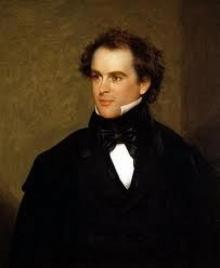 The Birthmark
The Birthmark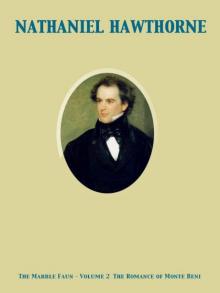 The Marble Faun; Or, The Romance of Monte Beni - Volume 1
The Marble Faun; Or, The Romance of Monte Beni - Volume 1 The Minister's Black Veil
The Minister's Black Veil The Great Stone Face, and Other Tales of the White Mountains
The Great Stone Face, and Other Tales of the White Mountains The House of the Seven Gables
The House of the Seven Gables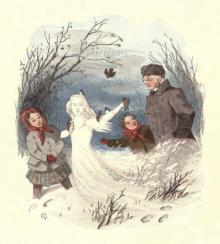 The Snow Image
The Snow Image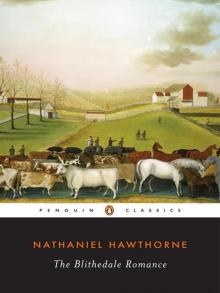 The Blithedale Romance
The Blithedale Romance Rappaccini's Daughter: By Nathaniel Hawthorne - Illustrated
Rappaccini's Daughter: By Nathaniel Hawthorne - Illustrated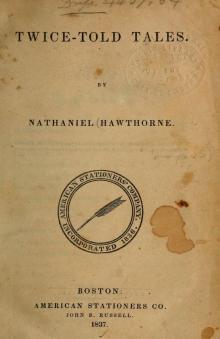 Twice-Told Tales
Twice-Told Tales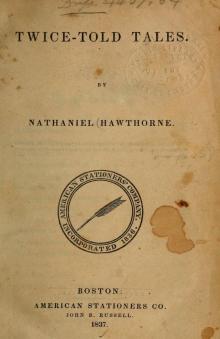 Twice Told Tales
Twice Told Tales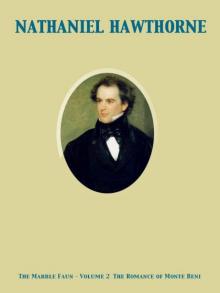 The Marble Faun; Or, The Romance of Monte Beni - Volume 2
The Marble Faun; Or, The Romance of Monte Beni - Volume 2_preview.jpg) Footprints on the Sea-Shore (From Twice Told Tales)
Footprints on the Sea-Shore (From Twice Told Tales) Main Street
Main Street_preview.jpg) The Seven Vagabonds (From Twice Told Tales)
The Seven Vagabonds (From Twice Told Tales) Fanshawe
Fanshawe Chippings with a Chisel
Chippings with a Chisel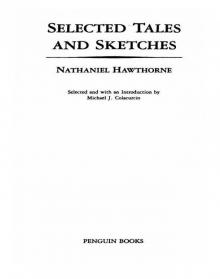 Selected Tales and Sketches
Selected Tales and Sketches Young Goodman Brown
Young Goodman Brown Roger Malvin's Burial
Roger Malvin's Burial The Prophetic Pictures
The Prophetic Pictures The Village Uncle
The Village Uncle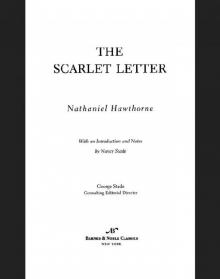 Scarlet Letter (Barnes & Noble Classics Series)
Scarlet Letter (Barnes & Noble Classics Series) The Procession of Life
The Procession of Life Drowne's Wooden Image
Drowne's Wooden Image Hawthorne's Short Stories
Hawthorne's Short Stories My Kinsman, Major Molineux
My Kinsman, Major Molineux Legends of the Province House
Legends of the Province House Foot-Prints on the Sea-Shore
Foot-Prints on the Sea-Shore The Haunted Quack
The Haunted Quack Tanglewood Tales
Tanglewood Tales The Seven Vagabonds
The Seven Vagabonds Mosses from an Old Manse, Volume 2
Mosses from an Old Manse, Volume 2 The Canterbury Pilgrims
The Canterbury Pilgrims Wakefield
Wakefield The Gray Champion
The Gray Champion The White Old Maid
The White Old Maid The Snow-Image: A Childish Miracle
The Snow-Image: A Childish Miracle The Gentle Boy
The Gentle Boy Mr. Higginbotham's Catastrophe
Mr. Higginbotham's Catastrophe![The Threefold Destiny: A Fairy Legend, by Ashley Allen Royce [pseud.] Read online](http://i1.bookreadfree.com/i2/04/10/the_threefold_destiny_a_fairy_legend_by_ashley_allen_royce_pseud__preview.jpg) The Threefold Destiny: A Fairy Legend, by Ashley Allen Royce [pseud.]
The Threefold Destiny: A Fairy Legend, by Ashley Allen Royce [pseud.] Lady Eleanore`s Mantle
Lady Eleanore`s Mantle The Great Carbuncle
The Great Carbuncle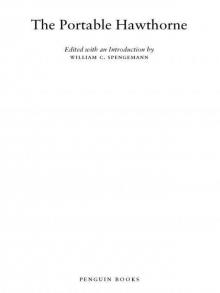 The Portable Hawthorne (Penguin Classics)
The Portable Hawthorne (Penguin Classics) True Stories from History and Biography
True Stories from History and Biography